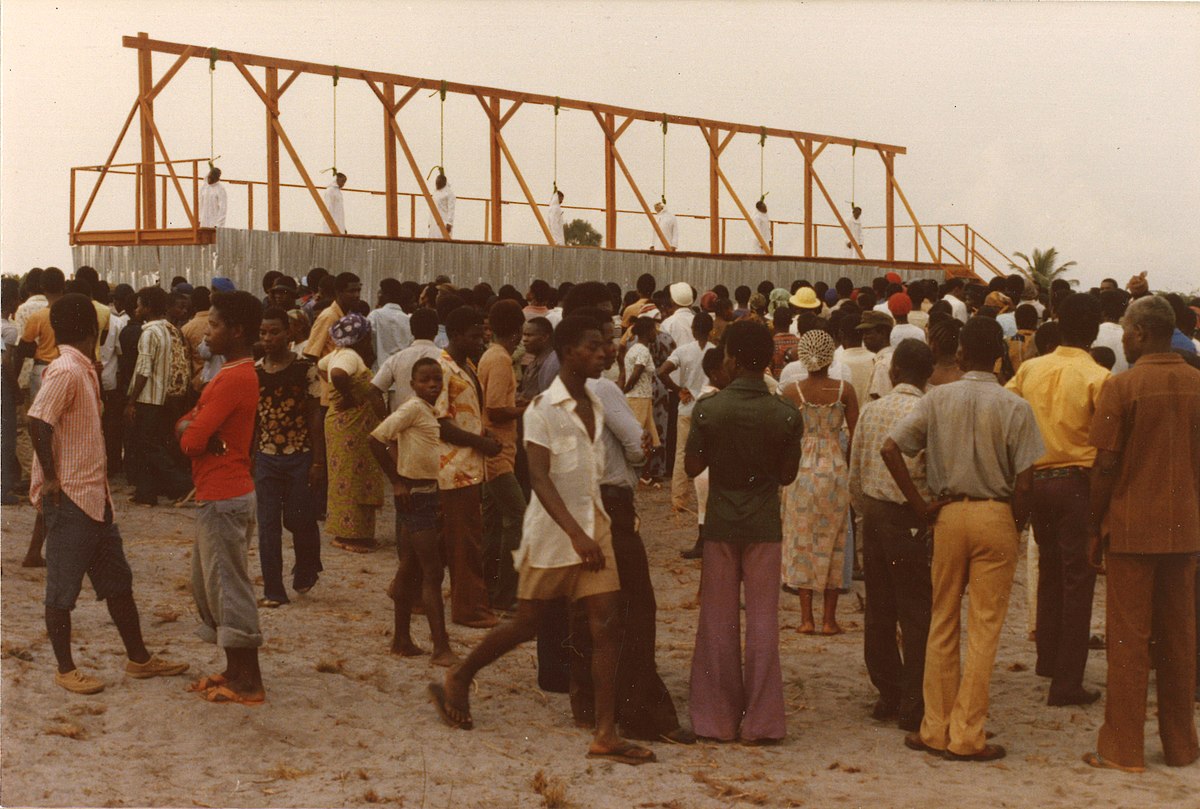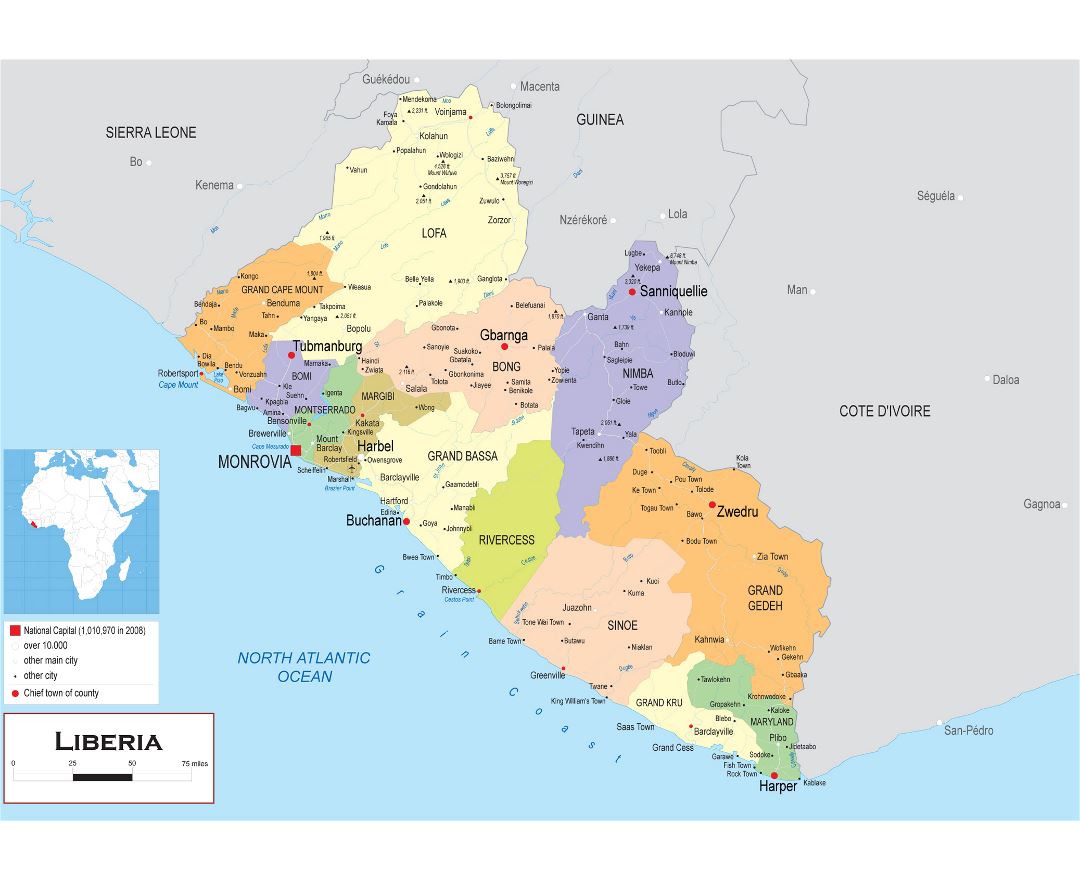Previous posts related to the murder of Mordecious Nyemah, who was the victim of a ritual murder on March 25, have been published on April 3, 5 and 22.
Last Saturday, May 15, Maryland County’s Superintendent, George A. Prowd, spoke memorable words at the funeral of the late Mordecious Nyemah. Prowd mentioned Maryland’s bad reputation as ‘Gboyo-business’ is concerned and more specifically he referred to one of his predecessors who was publicly hanged after being found guilty of a ritualistic murder. Superintendent James Anderson was one of seven convicts who were publicly executed at dawn in February 1979, a memorable event which made history as ‘The Hanging of the Harper Seven’. (NB Superintendent Prowd inadvertently called his condemned predecessor Allen Yancy. Yancy was one of the hanged Harper Seven, but was a member of the House of Representatives when he committed his atrocious crime.)
Superintendent Prowd lauded the police for acting swiftly and arresting the suspects of the killing of Mordecious Nyemah. He cautioned the people to remain law-abiding. It may be useful to recall that public protests over the ritualistic murders in the county led to rioting which even caused the government of President Weah to impose a curfew. (webmster FVDK).

Photo: FRED VAN DER KRAAIJ
Murdered Mordecious Nyemah finally interred

Published: May 18, 2021
By: The New Dawn, Liberia – By Patrick N. Mensah, Maryland County–Editing by Jonathan Browne
The remains of the late commercial motorcyclist Mordecious Nyemah, who was gruesomely murdered on 25th March 2021 in Maryland County have been laid to rest, two months after the killing that sparked violent protests in the county by angry citizens.The deceased was reportedly murdered by suspects Moses Mlarmah and others near Bassiken town between Gand Kru and Maryland. His remains were finally interred on Saturday, May 15, 2021.
The home-going ceremony for the late motorcyclist, also a student, was held at the Maranatha Heritage Assembly of God Church in Pleebo, Maryland County Electoral district#2. Sympathizers included county authorities, representatives of the business community, students and women groups, national security, religious community, Civil Society Organizations, traditional chiefs and elders, among others.
Maryland County Superintendent George A. Prowd applauded citizens for attending the burial of the late Mordecious Nyemah, whose murder he described as worrisome. He assured family of the deceased that justice will be accorded them for the murder of their son.
Superintendent Prowd said the Government of Liberia is committed to protecting lives of citizens and foreign residents, while condemning ritualistic killings across the country. According to him, there have been several death cases since he took office as superintendent, but the case of the late Mordecious Nyemah has drawn attention of both citizens and national government. Superintendent Prowd recalled that in the late 70’s, similar situation occurred in the county that involved former superintendent Allen Yancy and other high profile officials, who were tried, adjudged guilty and hanged.
“When you reflect your minds back to Maryland Gboyo history, you will get to know that most of those people, who were involved into ritualistic killings by then, were mostly government officials. I remember, there was a superintendent in Maryland who was caught for ritualistic killing and was hanged and because of this, many citizens look at us as suspects of these current ritualistic acts that are happening in this county”, Superintendent Prowd lamented. He expressed excitement that suspects have been arrested and placed behind bars, awaiting court trial in connection to the murder of the late Mordecial.
“We are too happy and thankful to God that one of the suspects, Moses, who was the first to be arrested, without medicine, without threats or torture, he’s started calling names of people who are involved into the death of Mordecial”, Prowd added. He continued that in as much the suspects are behind bars, there’s a strong case, and burial of the late Modecious doesn’t in anyway end the case.
The superintendent cautioned citizens to remain law-abiding and assist government in the ongoing hearing rather than staging protests that would disrupt the county and shut down economic activities.
He county authorities, including the Maryland Legislative Caucus have received series of letters from parents and other concerned groups over the release of alleged rioters that are in prison in Zwedru, Grand Gedeh County.
Prowd disclosed that those letters were sent to national government, and prayed that as soon as the case is being looked into and suspects are found guilty, it would be easy for President Weah to extended executive clemency. He urged parents of those suspects to remain peaceful as government is working out modality to transport at least three members of the bereaved family to Zwedru for the trial.
On April 5, 2021, police arrested and sent to the Zwedru Correction Palace scores of suspects, including Morris Senneh, President of the Pleebo Motorcyclists union, Thomas Kumah, president of Maryland County youth, Mamadou Diallo, Edward Toe, Sieh Gray, Edwin Lawal, Salu Ali, Lawrence Jarbee, and Wilfred Kuoh.
Also being held for the murder and subsequent rioting are Eugene Koppeh, George Nimely, John Davis, Patrick Wilson, Augustine Navy, Micheal Doblah, Sawo Bedel, Robert Wesseh, Fred Johnny, Peter Bestman, Moses Toe, Mashel Doloson, Thomas Kuma, Joseph Bannie, George Segbeh, Mark Freeman, Michael Tugbeh, Winston Smith, Christopher Dweh Prince Kouh, George Weah, John Collies, Chris Porka and Sham Beyslow.
They are accused of involving in multiple crimes during mass protests in demand of justice that led to the damage of government’s properties, including arson attacks on the home of Speaker Bhofal Chambers in Pleebo Sodoken district, Maryland County. The violence led President George Weah to impose a dusk to dawn curfew in the entire county, which subsequently calm the tension.
Source: Murdered motorcyclist finally interred

